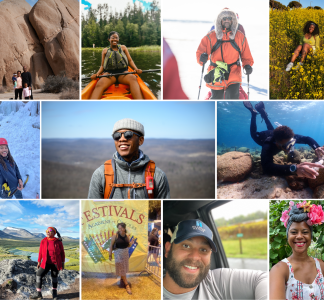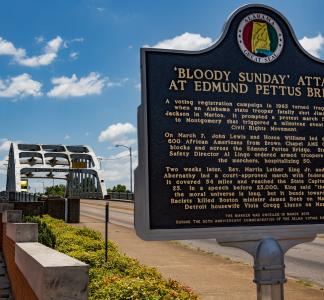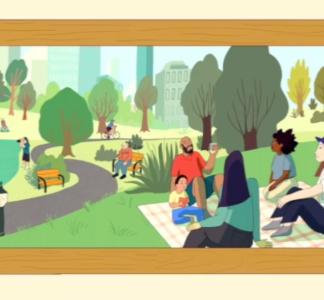Black inclusion and acceptance in the outdoors, 60 years after the Civil Rights Act

Woman enjoys the view at Olympic National Park
Carmen Velasco
Honor the Civil Rights Act's legacy by actively promoting equity, diversity, and inclusion in outdoor recreation.
The outdoors should be a space where everyone feels welcome, safe and empowered to connect with nature however they see fit. Despite that ideal, many Black communities experience significant obstacles to enjoying the outdoors fully—from limited access to green spaces, to fear of discrimination or harassment.
There’s no better time than now to decisively knock down some more of those barriers. In 2024, we’re marking the 60th anniversary of both the Civil Rights Act and the Wilderness Act—twin reminders that we can take major steps together to strengthen our common sense of community and enrich the resources we all share.
At the same time, it wasn’t until 1945—in living memory—that national parks were even officially desegregated, a reminder that some of our most painful history isn’t all that distant. We must confront these truths and redouble our efforts to create more inclusive and equitable outdoor experiences.

Climbers, including Charles Crenchaw, navigate cornice on Karstens Ridge in Denali
Norman Benton
Breaking down barriers in Charles Crenchaw’s spirit
Among other major breakthroughs from 1964, that was also the year Charles Crenchaw became the first Black American to summit Denali in Alaska. His achievement not only inspired future generations of Black outdoor enthusiasts, but also underscored the importance of diversity and representation in outdoor spaces.
Now, 60 years later, there’s a new generation of trailblazers and advocates carrying forward Charles Crenchaw’s legacy—breaking down stereotypes, fostering a sense of belonging and empowering Black individuals to embrace the outdoors:
- Outdoor Afro has been pivotal in celebrating and inspiring Black connections and leadership in nature by organizing hiking, camping and other outdoor activities. By providing a supportive environment and highlighting the historical connections between Black people and the land, Outdoor Afro is challenging stereotypes and fostering a deeper appreciation for nature.
- Melanin Base Camp serves as a platform for outdoor enthusiasts of color to share their stories, experiences, and expertise in the outdoors. Through their online community, Melanin Base Camp is amplifying diverse voices and perspectives in outdoor recreation, inspiring others to explore the outdoors and fostering a sense of camaraderie among outdoor enthusiasts of color.
- GirlTrek takes a unique approach by focusing on walking as a form of activism and self-care for Black women and girls. Through their grassroots initiatives, GirlTrek encourages Black women to prioritize their health and wellness by incorporating daily walks into their routines and reclaiming public spaces for physical activity and community engagement.
- Outdoorsy Black Women provide opportunities for Black individuals, particularly women, to participate in outdoor activities such as kayaking, rock climbing, and backpacking. By creating spaces specifically designed for Black adventurers, OBW is building confidence, skills, and connections that empower participants to explore new horizons and push their boundaries in the great outdoors.
There are many more groups doing similarly important work to increase access and challenge the notion that outdoor recreation is exclusive to certain demographics. They are reshaping the outdoor narrative, advocating for a more inclusive outdoor culture where everyone feels welcome, represented and empowered to explore and enjoy the natural world.
Looking to a genuinely equitable and accessible future
All year long, we should honor the legacies of the Civil Rights Act by championing equity, diversity and inclusion in outdoor recreation.
This means not only advocating for policies that promote equitable access to parks, trails, and wilderness areas, but also actively engaging with and amplifying the voices of marginalized communities—including recognizing the historical exclusion of Black people and communities from outdoor spaces.
Let us build a future where everyone, regardless of race or background, feels valued and empowered to enjoy the beauty of nature. By working together, we can ensure that the beauty and majesty of nature reflect the richness and diversity of America for generations to come.



